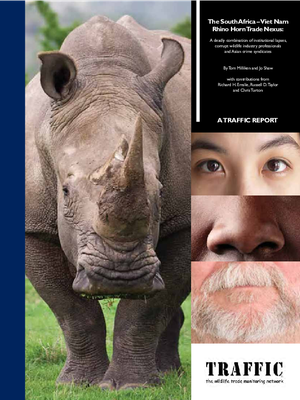The South Africa - Viet Nam Rhino Horn Trade Nexus: A Deadly Combination of Institutional Lapses, Corrupt Wildlife Industry Professionals and Asian Crime Syndicates

This is a 2012 TRAFFIC report summarizing the dynamics and drivers of the illegal trade in rhino horn from South Africa to Vietnam and aims to contribute understanding toward the “salient factors both in source country and end-use markets that underlie the current rhino crisis.”
Key Points in Document:
- This is a 2012 TRAFFIC report summarizing the dynamics and drivers of the illegal trade in rhino horn from South Africa to Vietnam and aims to contribute understanding toward the “salient factors both in source country and end-use markets that underlie the current rhino crisis.”
- The authors collected qualitative and quantitative data for this report through meetings and personal interviews with key individuals from the South African wildlife agency, Vietnamese academics and government officials involved in wildlife trade, bilateral meetings with South African and Vietnamese officials on rhino horn trade, and a comprehensive literature search on reports of and current events regarding rhino conservation and trade.
- The report includes a wealth of information about the rhino horn trade between South Africa and Vietnam, including: information on rhino populations in both countries; background on rhino-related industries in South African; laws and policies regarding wildlife trade; a history of rhino crimes and trade in both countries; the presence and actions by law enforcement in both countries; demand and markets for rhino horn in Vietnam; and, recommendations for combatting the illegal trade of rhino horn and associated threats to rhino populations.
- In South Africa, the authors hypothesize that despite the positive record of rhino conservation, “unscrupulous wildlife professionals, some corrupt government officials, and hardened Asian criminal syndicates” have combined to undermine and reverse progress on rhino conservation. The authors provide recommendations for solving this problem, including addressing capacity and resource constraints, promoting collaborative law enforcement, ensure appropriate penalties are applied to criminals, tighten law enforcement at ports of entry and exit, and designate rhino crime cases to specific prosecutors.
- In Vietnam, it is hypothesized that the country is likely the leading importer and consumer of rhino horn. To address this problem, the authors recommend several actions, including strengthening legislation and penalties for criminals, implement bilateral treaties to promote cross-border law enforcement collaboration, employ effective law enforcement strategies in the market, and increase financial and manpower to trafficking.
Citation: Milliken T, Shaw J. The South Africa - Viet Nam Rhino Horn Trade Nexus: A Deadly Combination of Institutional Lapses, Corrupt Wildlife Industry Professionals and Asian Crime Syndicates. Johannesburg, South Africa; 2012.

